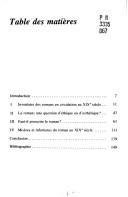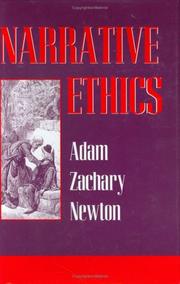| Listing 1 - 3 of 3 |
Sort by
|

ISBN: 0775800813 9780775800814 Year: 1977 Volume: 30 Publisher: Montréal, Québec : Hurtubise - H.M.H.,
Abstract | Keywords | Export | Availability | Bookmark
 Loading...
Loading...Choose an application
- Reference Manager
- EndNote
- RefWorks (Direct export to RefWorks)
Fiction --- Public opinion --- Roman --- Opinion publique --- Moral and ethical aspects --- Aspect moral --- Public opinion. --- Moral and ethical aspects. --- Roman québécois --- Histoire et critique. --- Québec. --- Geschichte --- 1800-1900 --- Fiction - Public opinion. --- Public opinion - Québec (Province) --- Fiction - Moral and ethical aspects. --- Roman quebecois --- 19e siecle
Multi
ISSN: 09298436 ISBN: 9789042037281 9042037288 1306167620 9401209820 9789401209823 9781306167628 Volume: 267 Publisher: Amsterdam
Abstract | Keywords | Export | Availability | Bookmark
 Loading...
Loading...Choose an application
- Reference Manager
- EndNote
- RefWorks (Direct export to RefWorks)
While Plato recommended expelling poets from the ideal society, W. H. Auden famously declared that poetry makes nothing happen. The 19 contributions to the present book avoid such polarized views and, responding in different ways to the “ethical turn” in narrative theory, explore the varied ways in which narratives encourage readers to ponder matters of right and wrong. All work from the premise that the analysis of narrative ethics needs to be linked to a sensitivity to esthetic (narrative) form. The ethical issues are accordingly located on different levels. Some are clearly presented as thematic concerns within the text(s) considered, while others emerge through (or are generated by) the presentation of character and event by means of particular narrative techniques. The objects of analysis include such well-known or canonical texts as Biblical Old Testament stories, Mark Twain’s Huckleberry Finn , J. R. R. Tolkien’s The Lord of the Rings , Vladimir Nabokov’s Lolita , Jonathan Littell’s The Kindly Ones , Ann Radcliffe’s The Italian and Matthew Lewis’s The Monk . Others concentrate on less-well-known texts written in languages other than English. There are also contributions that investigate theoretical issues in relation to a range of different examples.
Ethics in literature --- Literature and morals --- Narration (Rhetoric) --- Fiction --- Moral and ethical aspects --- Ethics in literature - Congresses --- Literature and morals - Congresses --- Narration (Rhetoric) - Moral and ethical aspects - Congresses --- Fiction - Moral and ethical aspects - Congresses --- Ethics in literature. --- Metafiction --- Novellas (Short novels) --- Novels --- Stories --- Literature --- Novelists --- Moral and ethical aspects. --- Philosophy

ISBN: 0674600878 0674600886 0674041461 Year: 1995 Publisher: Cambridge, MA : Harvard University Press,
Abstract | Keywords | Export | Availability | Bookmark
 Loading...
Loading...Choose an application
- Reference Manager
- EndNote
- RefWorks (Direct export to RefWorks)
The ethics of literature, formalists have insisted, resides in the moral quality of a character, a story, perhaps the relation between author and reader. But in the wake of deconstruction and various forms of criticism focusing on difference, the ethical question has been freshly negotiated by literary studies, and to this approach Adam Newton brings a startling new thrust. His book makes a compelling case for understanding narrative as ethics. Assuming an intrinsic and necessary connection between the two, Newton explores the ethical consequences of telling stories and fictionalizing character, and the reciprocal claims binding teller, listener, witness, and reader in the process. He treats these relations as defining properties of prose fiction, of particular import in nineteenth- and twentieth-century texts. Newton's fresh and nuanced readings cover a wide range of authors and periods, from Charles Dickens to Kazuo Ishiguro and Julian Barnes, from Herman Melville to Richard Wright, from Joseph Conrad and Henry James to Sherwood Anderson and Stephen Crane. An original work of theory as well as a deft critical performance, Narrative Ethics also stakes a claim for itself as moral inquiry. To that end, Newton braids together the ethical-philosophical projects of Emmanuel Levinas, Stanley Cavell, and Mikhail Bakhtin as a kind of chorus for his textual analyses--an elegant bridge between philosophy's ear and literary criticism's voice. His work will generate enormous interest among scholars and students of English and American literature, as well as specialists in narrative and literary theory, hermeneutics, and contemporary philosophy.Table of Contents: Acknowledgments Abbreviations Narrative as Ethics Toward a Narrative Ethics We Die in a Last Word: Conrad's Lord Jimand Anderson's Winesburg, Ohio Lessons of (for) the Master: Short Fiction by Henry James Creating the Uncreated Features of His Face: Monstration in Crane, Melville, and Wright Telling Others: Secrecy and Recognition in Dickens, Barnes, and Ishiguro Conclusion Notes Index Reviews of this book: Newton's book will become a pivotal text in our discussions of the ethical implications of reading. He has taken into account a great deal of prior work, and written with judgment and wisdom.--Daniel Schwartz, NarrativeReviews of this book: Newton offers elegant, provocative readings of texts ranging from The Rime of the Ancient Mariner to Winesburg, Ohio, The Remains of the Day, and Bleak House.Newton's book is a rich vein of critical ore that can be mined profitably.--ChoiceReading Narrative Ethics is a powerful experience, for it engages not just the intellect, but the emotions, and dare I say, the spirit. It stands apart from recent books on ethics in literature by virtue of its severe insistence o its allegiance to an alternative ethical tradition. This alternative way of thinking--and living--has its roots in the work of the Jewish philosopher Emmanuel Levinas and finds support in the writings of Mikhail Bakhtin and Stanley Cavell.Stories, Newton asserts, are not ethical because of their morals or because of their normative logic. They are ethical because of the work they perform, in the social world, of binding teller, listener, witness, and reader to one another.This is a work of passion, integrity, commitment, and mission.--Jay Clayton, Vanderbilt UniversityNewton probes with admirable subtlety the key question: what do we gain--and what dangers do we run--when we fully enter the life of an 'other' through that 'other's' story? We have here a rare combination of deep and learned critical acumen with passionate love for literature and sensitivity to its nuances.--Wayne C. Booth, University of ChicagoAdam Zachary Newton writes with illuminating passion. Drawing on writers as diverse as Conrad and Henry James, Melville and Sherwood Anderson, Bakhtin and Levinas, he asks what it is to turn one's life into a story for another, and what it is to respond to, or avoid the claim of, another person's narration. He has written a wonderful, important book.--Martha Nussbaum, University of Chicago
Ethics in literature --- Fiction --- Philosophy, Modern --- Ethics, Modern --- Narration (Rhetoric) --- American fiction --- English literature --- Moral and ethical aspects --- History and criticism --- Theory, etc. --- Ethics in literature. --- Narration (Rhetoric). --- Moral and ethical aspects. --- Ethics [Modern ] --- Ethiek [Moderne ] --- Ethiek in de literatuur --- Ethique dans la littérature --- Ethique moderne --- Narration (Rhétorique) --- Narrative writing --- Verhaal (Retoriek) --- American literature --- General ethics --- Thematology --- Literary rhetorics --- -English literature --- -Ethics in literature --- -Fiction --- -Narration (Rhetoric) --- -Narrative (Rhetoric) --- Rhetoric --- Discourse analysis, Narrative --- Narratees (Rhetoric) --- Modern philosophy --- Metafiction --- Novellas (Short novels) --- Novels --- Stories --- Literature --- Novelists --- Modern ethics --- British literature --- Inklings (Group of writers) --- Nonsense Club (Group of writers) --- Order of the Fancy (Group of writers) --- -Theory, etc --- Philosophy --- Narrative (Rhetoric) --- History and criticism&delete& --- Theory, etc --- English fiction --- Rhetoric - Moral and ethical aspects. --- Fiction - Moral and ethical aspects. --- Ethics, Modern. --- Language and languages --- Speaking --- Authorship --- Expression --- Literary style --- History and criticism. --- 82:17 --- 82:17 Literatuur en ethiek --- Literatuur en ethiek --- Roman américain --- Littérature anglaise --- Théorie littéraire --- Roman américain --- Littérature anglaise --- Théorie littéraire
| Listing 1 - 3 of 3 |
Sort by
|

 Search
Search Feedback
Feedback About
About Help
Help News
News